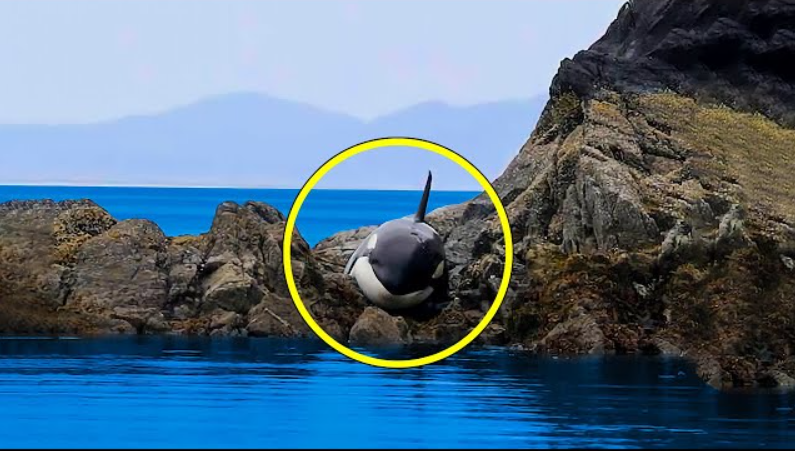
“This Orca cried and whined for her pod to come get her when she found herself beached on the sharp rocks. Her family couldn’t help her, but what Rescuers did is incredible.

The last place you would expect to see an orca is on dry land, but that was what Eric Keen found when he went to investigate strange sounds he heard while sailing the seas around British Columbia early one July morning in 2015.
Eric is a whale researcher, and he was on his vessel, the Bangarang, conducting a study on fin whales in the area when he heard mournful cries from a small outcropping of jagged stone on the shore of Andrew Rocks. A young Orca was in obvious distress, wedged between sharp rocks increasingly out of the water. According to Save Our Seas, Janie Ray, and Hermann Muter, about 7:30 am, Eric called the local Environmental Group, Whale Point, to tell them what he had found.
From Eric’s description, the Orca experts realized what must have happened. Orca pods in that area would often collaborate to hunt seals for food. Some orcas would chase the seals towards the shore, while others patiently waited to spring the trap. This young female Orca must have miscalculated her position, and as the tide went out, found herself in shallower and shallower water until there was no way to extricate herself from where she lay wedged between the rocks. She was bellowing for help, obviously scared and probably in pain.
When Eric fortunately sailed nearby, Eric was well known to Janie and Hermann, often working closely with them on their research. They were traveling back from Hartley Bay towards their base when he alerted them to the young Orca’s plight. Janie and Hermann knew that time was of the essence and that they would need all the help they could get. So, as they raced north to join Eric in Squally Channel, they also contacted Gitka’s Guardians at Hartley Bay and Fisheries and Oceans Canada (DFO), both marine organizations, to alert them to the young Orca’s desperate situation.
Meanwhile, Eric and his crew approached the Orca to see whether they could help her get off the rocks. They did not get too close to her at first to avoid startling her and causing her to hurt herself. The reality of the situation was that if they had tried to lift her off the rocks or to pull her, they would have injured her very badly because the rocks were covered in barnacles, which could have cut her skin. As it was, she was bleeding a little from her pectoral area and her tail.
At the arrival of Janie and Hermann, Eric learned that John Ford and Paul Cottrell of DFO had given guidance over a satellite phone to keep the Orca cool and wet until the tide rose once more, at which time she would be able to free herself. The tide, however, would not rise again for another eight hours, and so the marathon rescue began.
When they first approached her, the Orca was obviously anxious about what their intentions might be. To be trapped and in discomfort and surrounded by humans must have been pretty scary for a young killer whale. Her breathing was quick and shallow, and gravity was obviously making it harder for her. Eric ingeniously put together a makeshift water pump from a hose and some duct tape and went to the backside of the island where he worked the pump for Hermann, who used the hose to soak the Orca with cooling seawater.
All of the Rescuers soaked sheets in seawater and placed these gently along the length of the Orca’s body. As they worked, the Rescuers noticed that the Orca’s cries were quieting down, and her breathing was becoming calmer. It seemed the humans had won the Orca’s trust as they were the ones comforting her while her own family could only stay in the waters nearby and call to her.
The Rescuers took turns to pump the seawater over the young Orca and to replace the sheets covering her with freshly sea-dipped cooler sheets. They could see that the Orca calf’s dorsal fin was getting dry, so they used a pillowcase from Eric’s boat to wet with seawater and cover the fin.
All morning, the weather had fortunately been gray and overcast. However, as the sun rose to its zenith at noon, the cloud cover dispersed, and the heat of the day began in earnest. Everyone worked tirelessly to keep the Orca cool and wet, working in shifts.
The humans carefully took care of the Orca as if she had a fever, replacing the drier, warmer coverings with cooler, wetter ones all the time, dousing her with seawater from the pump, making sure she would not dry out from the heat of the sun.
The Rescuers could not help thinking how bad things might have been for the young female Orca had Eric not heard her cries. Until this point, the Rescuers had not placed anything over the Orca’s head as they did not want her to panic with her sight suddenly taken away. She could have felt even more vulnerable.
However, the fierceness of the sun made it absolutely necessary to protect the Orca’s delicate skin from the heat and dryness. Janie describes how she watched one of the team approach the Orca, inching his way slowly into the water in front of her head and delicately placing a wet, cool sheet over her head, taking great care not to cover her blowhole.
This Orca’s youth and relatively small size were in her favor; she was only nine years old. The average life expectancy in the wild is between 30 and 50 years, and around 7,000 pounds (3,175 kilograms) in weight.
True, this is the weight of your average hippopotamus or rhinoceros, or seven cows if you can visualize that better. But a fully grown male can weigh up to sixteen thousand pounds (7,257 kilograms). Had this beached Orca been older and bigger, the pressure on her lungs would have been greater, and she may well not have lived until the next tide.
The water pump eventually broke; there was no fixing it, no matter how much duct tape Eric used. This could have been a devastating blow, but just at that moment, the sea began to rise again. After a total of nine exhausting hours, the tide had risen sufficiently for the Rescuers to begin the process of setting the young Orca free. They removed the sheets from her body and head and the pillowcase from her dorsal fin. The team knew that the time had come for the Orca to do what only she could do, and that’s swim out of her rocky prison.
They did not want their presence to startle her into trying too soon and injuring herself more seriously, and so they walked away and climbed up onto a nearby cliff to watch and wait. All of them felt the same, sending her all their wishes for strength and willing her to have the ability to free herself.
The water level slowly began to creep up the young Orca’s body until it covered her. As it happened, she began to cry out once more. This vocalization seemed different; perhaps it was excitement that soon she could be released, and yet she continued to lie there. She would occasionally lift her tail, but she was making no attempt to swim.
Her Rescuers were becoming worried; they wondered if something was wrong. Perhaps she was more badly injured than they had thought; maybe she was too drained from her long ordeal to make this one last gargantuan push to escape.
They realized then that they only needed to trust the Orca calf’s natural instincts. By moving her tail, she had been testing the depth of the water, and when she knew that it was safe and that she would not risk harm, she suddenly struck out in two huge thrusts, free of the rocks. She sped through the sea.
From where they stood watching from their boats and on the rocks all around her, human Rescuers screamed, ‘You go, girl!’ and cheered in exhilaration and relief. They had done it. It had taken more than nine hours of hard work and tender care, but they had managed to keep the young Orca alive and well until she could return to her pod once more.
Eric had placed a hydrophone into the water and was able to play the rescue as the Orca’s song. As she vocalized over and over, calling for a response from her family, for a while, her voice was the only one. Eric and his fellow miracle workers experienced a moment of concern and doubt. Where was the young Orca’s pod? Had they given up on her after such a very long time on land? Had they sadly swum away to mourn her loss?
As faint replies to the rescued Orca’s cries started to become audible from some distance away, a wave of relief washed over the waiting listeners. The young female evidently heard her family’s replies too, as she swam in the direction of their transient calls, speeding away in joy and the thrill of release.
The team of human Rescuers stood together in their shared emotions. They were feeling so proud and overwhelmed by what they had managed to do together. Every one of them had given their all. They sighed with relief, knowing that what they had experienced that day would stay with them all for as long as they lived. What a great ending!




